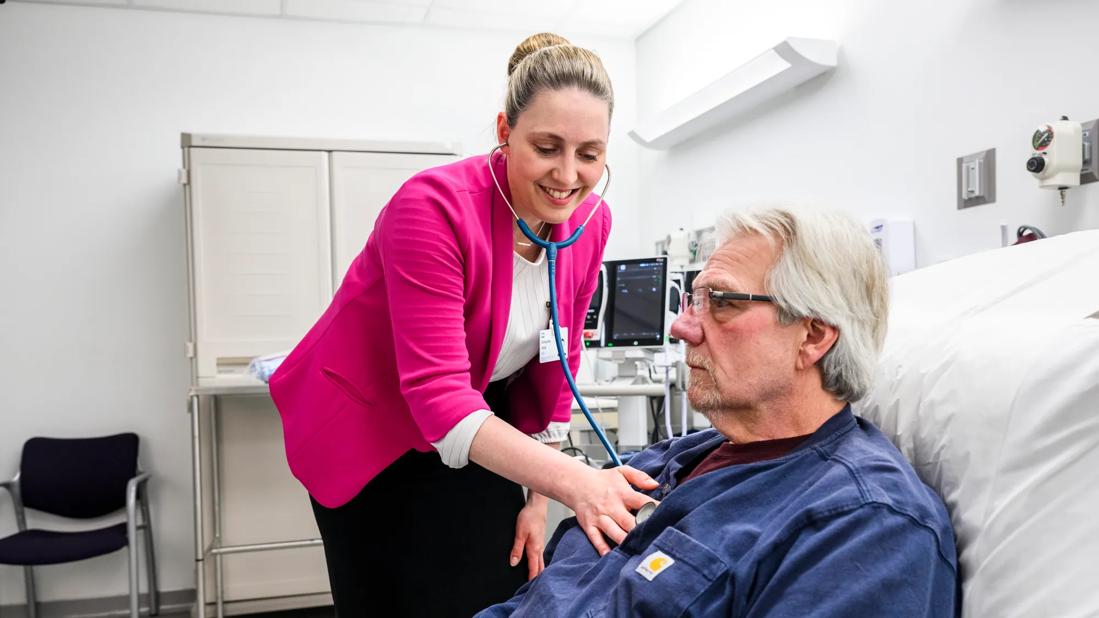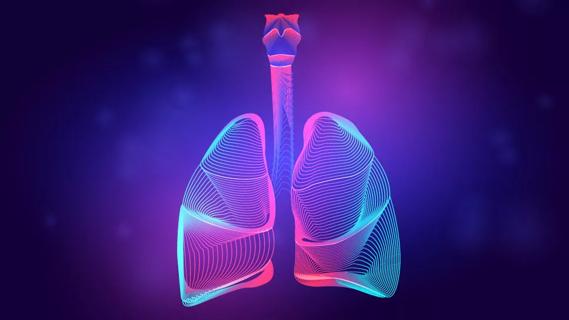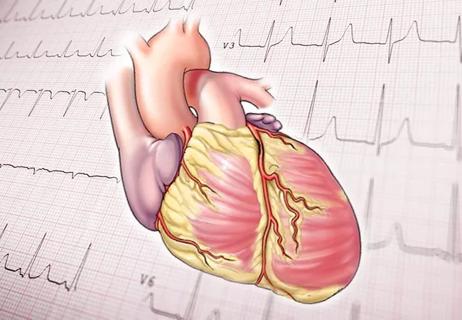Eminent clinician-researcher brings special expertise in nutritional interventions for heart failure

A decade after completing fellowships at Cleveland Clinic in Cardiovascular Medicine and in Advanced Heart Failure and Cardiac Transplantation, Amanda Vest, MBBS, MPH, has returned to Cleveland Clinic as its new Section Head of Heart Failure and Transplantation Cardiology. Originally from the United Kingdom, Dr. Vest earned her medical degree with distinction from the Imperial College School of Medicine in London and a master’s degree in public health from Harvard. She was most recently Director of the Advanced Heart Failure Program at Tufts Medical Center.
Advertisement
Cleveland Clinic is a non-profit academic medical center. Advertising on our site helps support our mission. We do not endorse non-Cleveland Clinic products or services. Policy
A prominent expert in heart failure, she is a fellow of the Heart Failure Society of America (HFSA), American Heart Association (AHA) and American College of Cardiology (ACC) and is co-author of their joint 2022 ACC/AHA/HFSA Guideline for the Management of Heart Failure. She is also a diplomate of the American Board of Obesity Medicine.
“Dr. Vest is an eminent leader in the growing field of heart failure and transplantation,” says Samir Kapadia, MD, Chair of Cardiovascular Medicine at Cleveland Clinic. “She has national prominence as a great physician and a very good researcher. We look forward to her leadership to help grow our advanced heart failure program even further.”
Consult QD recently spoke with Dr. Vest about returning to Cleveland Clinic, her research interests and what’s on the horizon in her subspecialty.
Q: What drew you back to Cleveland Clinic at this time?
A: I had an unexpected opportunity to return to this department that is a global leader in heart failure and transplantation cardiology. I am delighted to be back in Cleveland working with outstanding faculty and fellows alike and to have the opportunity to mentor across the clinical and research domains. It’s an exciting time to be in this field, with new advances being made in many aspects of heart failure, mechanical circulatory support and transplantation clinical care. Cleveland Clinic has a great infrastructure to foster collaboration and innovation and to be at the forefront of this progress.
Q: You’ve carved out a distinctive niche in the field of heart failure. Can you tell us about it?
Advertisement
A: My chief research interest is in the disordered metabolism seen in patients with heart failure along the spectrum of body composition — from obesity to cachexia — and the possibility of nutritional interventions. I was introduced to this area during my fellowship years at Cleveland Clinic under the research mentorship of heart failure cardiologist James Young, MD, focusing on the relationship between obesity and heart disease and cardiac responses to bariatric surgery. I have since established the Nutrition-Heart Failure research program, expanding my academic interests to include malnutrition and muscle wasting in patients with heart failure, both of which are associated with reduced survival.
A current study in the latter area that I’m leading is ASTRID-HF (A Skeletal Muscle Recovery Intervention with Dietary Protein in Heart Failure; NCT05627440), which aims to determine whether dietary protein supplementation can prevent muscle wasting or even help regain muscle mass. Patients with heart failure with reduced ejection fraction are being randomized to receive either no, low- or high-dose protein supplementation over six months. In addition to comparing skeletal muscle mass, strength and function, we are investigating metabolic activity in the GDF-15 and activin type IIA/IIB receptormuscle-wasting pathways.
We developed our understanding of the potential for reversal of muscle wasting by studying the impact of left ventricular assist device (LVAD) implantation on body composition. We have shown that LVAD recipients with advanced systolic heart failure and severe muscle wasting achieved significant recovery of skeletal muscle mass over the first six months following LVAD implantation (Circ Heart Fail. 2022;15[5]:e009012).
Advertisement
One of our more recent related studies found that although cachexia is associated with overall higher mortality during LVAD support, early weight gain after implantation is associated with reduced risk of death (J Am Heart Assoc. 2023;12[13]:e029086). To me, this observation also supports the potential value of promoting weight gain in patients with cardiac cachexia who will not be receiving an LVAD through nutritional or pharmacological strategies. We recently published these concepts in a State-of-the-Art Review of cardiac cachexia in JACC:Heart Failure (Epub 2024 May 8).
Q: What do you see as some of the most notable new developments in heart transplantation?
A: The field has recently seen an explosion of new technologies and innovations. One is in the area of rejection surveillance, which conventionally relies on endomyocardial biopsy. Centers are currently transitioning away from this strategy towards noninvasive protocols using blood-based assays using donor-derived cell-free DNA along with gene expression profiling. I recently led a multicenter team to develop a practical guide to using these new technologies for rejection surveillance (JACC Heart Fail. 2023;11[3]:263-276).
Also, the field of transplantation is seeing rapidly evolving technologies for preservation and transportation of organs, enabling the recovery of donor hearts from more distant geographic locations as well as reanimation of extended criteria organs, all of which is increasing the yield of high-quality donor hearts. I am very excited to have the opportunity, in collaboration with my cardiac surgery colleagues, to be at the forefront of innovations with organ care systems and methods of recovery moving forward.
Advertisement
Q: Is there any other research you’d like to highlight?
A: Mechanical circulatory support is critical to patient success in our field, with new devices continually becoming available. Cleveland Clinic is a study site for the ongoing Impella-Protected Cardiac Surgery Trial (IMPACT; NCT05529654), which is investigating the preemptive use of temporary mechanical support to prevent cardiogenic shock in high-risk patients undergoing CABG or valve replacement or repair. The use of novel therapies to treat heart muscle disorders, such as monoclonal antibody to remove amyloid fibrils in cardiac amyloidosis (NCT05521022) and gene therapy for hypertrophic cardiomyopathy (NCT05836259) are exciting areas of investigation where Cleveland Clinic cardiologists are at the forefront of new advances.
Q: What new developments at Cleveland Clinic can you share?
A: We’re in a very exciting phase with expansion of the heart failure section beyond our main campus. We have recruited advanced heart failure specialists to some of our regional hospitals in Northeast Ohio, principally our Hillcrest and Fairview hospitals, with others joining shortly. Providing local access to high-quality heart failure services and better facilitating timely referrals for LVADs and transplantation will be a huge benefit to patients in these regions. There has also been rapid growth in heart failure services at Cleveland Clinic centers in Florida, Abu Dhabi and London.
Advertisement
Advertisement

Experts are challenging the one-size-fits-all paradigm

Decongestion, therapy titration and readmission rates comparable to those with traditional hospital care

Metabolites from animal product substrates implicated in heart failure development in community cohorts

Panel proposes staging and treatment protocols that support harmonized evaluation and management of heart failure in patients with congenital heart disease

Recent volume and outcomes data in two major realms of cardiovascular care

Volatile organic compounds have potential in heart failure diagnostics

Basic understanding of condition and treatment is lacking

Indications and issues concerning cardiac resynchronization therapy, conduction system pacing